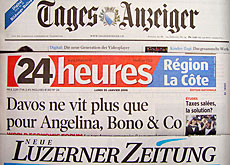
WEF gets lukewarm reaction from Swiss press

Many Swiss newspapers are wondering what the fuss was about at the 2006 World Economic Forum (WEF) summit in Davos.
While some dailies devoted several pages to the meeting’s end, there was still a dearth of commentary on the event itself in any of Switzerland’s main three national languages.
Even the prestigious Neue Zürcher Zeitung gave its editoralists a day-off and left it at reports and a feature in Monday’s edition.
One newspaper that did wager to give its opinion on the five-day proceedings was the Lausanne-based 24 Heures. It dared to ask: what was it that made people run to the WEF?
It argued that the meeting’s content could hardly justify the degree of media coverage it was given and perhaps that was why it was important that a healthy quota of celebrities graced the event.
This year’s star count included actors Angelina Jolie, Brad Pitt and Michael Douglas and musicians Peter Gabriel and Bono.
Sex business
An answer to what made people want to attend the Davos summit was provided by another French-language daily, Le Temps.
It revealed that the most popular roundtable during this year’s meet out of 240 offerings was the one on sex and business, which told listeners that high flyers often do not have or make the time for “a bit of rumpy-pumpy”.
For the Zurich-based Tages-Anzeiger, this roundtable’s popularity was cause for concern and a reason to wonder whether the WEF was losing importance.
It suggested that the presence of celebrities at Davos with their own agendas for making the world a better place could be leading to the forum’s demise.
If actor Angelina Jolie talked about the plight of refugees and Microsoft entrepreneur Bill Gates fought tuberculosis, what was left for the WEF to tackle?
However, it also concluded that the importance of the annual summit was not to be underestimated even if it could not fulfil the ambition of its founder Klaus Schwab to set the global agenda for the coming year.
The summit still allowed an extraordinary number of people from a multitude of countries to come together and discuss important issues.
As for this year’s meeting focusing on the economic growth of India and China, Le Temps called this a “curious myopia”. It added that the focus on “Chindia” left Europe and Russia in the shade.
It noted the absence of European leaders attending – bar German chancellor Angela Merkel – and conjectured that Europe did not need Davos to discuss its future.
Networking
A number of dailies, however, agreed that the annual meeting still offered unparalleled opportunities for networking.
One example mentioned was the progress made by Swiss Economics Minister Joseph Deiss on trade talks with the United States on the fringes of the summit.
While the two parties are unlikely to sign a trade accord, they have committed to working more closely together on a sectoral basis.
Deiss also organised an informal meeting of 20 trade ministers, focusing on pushing forward the World Trade Organization’s efforts to liberalise global trade.
swissinfo, Faryal Mirza
The World Economic Forum (WEF), formerly the European Management Symposium in Davos, was founded by Klaus Schwab in 1971.
The annual WEF summit takes place in the Swiss resort of Davos, but in 2002 the meeting was held in New York – the site of the 9/11 attacks four months earlier.
Controversy over the past few years whether the mountain resort is the right venue for WEF meeting has died down.
The 2006 WEF summit attracted about 2,400 participants, including 735 top business leaders, 15 heads of state and prime ministers, as well as stars of the US film industry, such as Angelina Jolie and Michael Douglas.
Talks also took place on the latest round of trade liberalisations under the auspices of the World Trade Organization.
Five Swiss cabinet members met senior government ministers from the US, Russia and China in Davos.
Microsoft chairman Bill Gates launched a global initiative to eradicate tuberculosis and a RED brand was set up by musician Bono to fund the fight against Aids.
The slogan of the 36th WEF summit was “Creative imperative”.
Key political and economic themes at the meeting were the emergence of China and India and building trust in leaders and institutions.

In compliance with the JTI standards
More: SWI swissinfo.ch certified by the Journalism Trust Initiative






























You can find an overview of ongoing debates with our journalists here . Please join us!
If you want to start a conversation about a topic raised in this article or want to report factual errors, email us at english@swissinfo.ch.